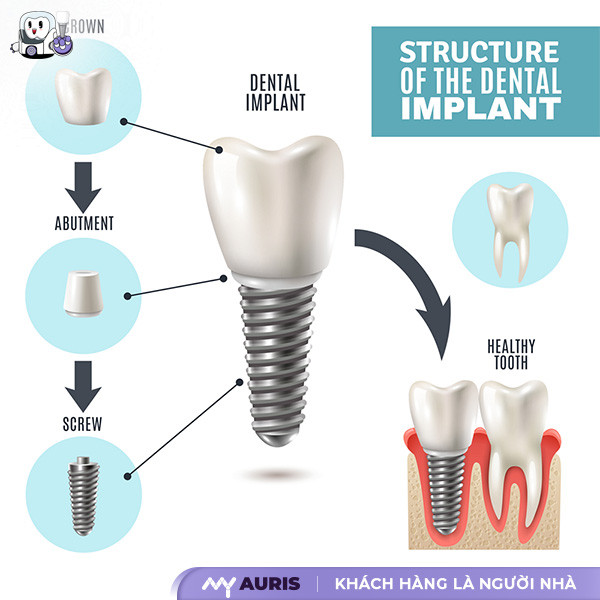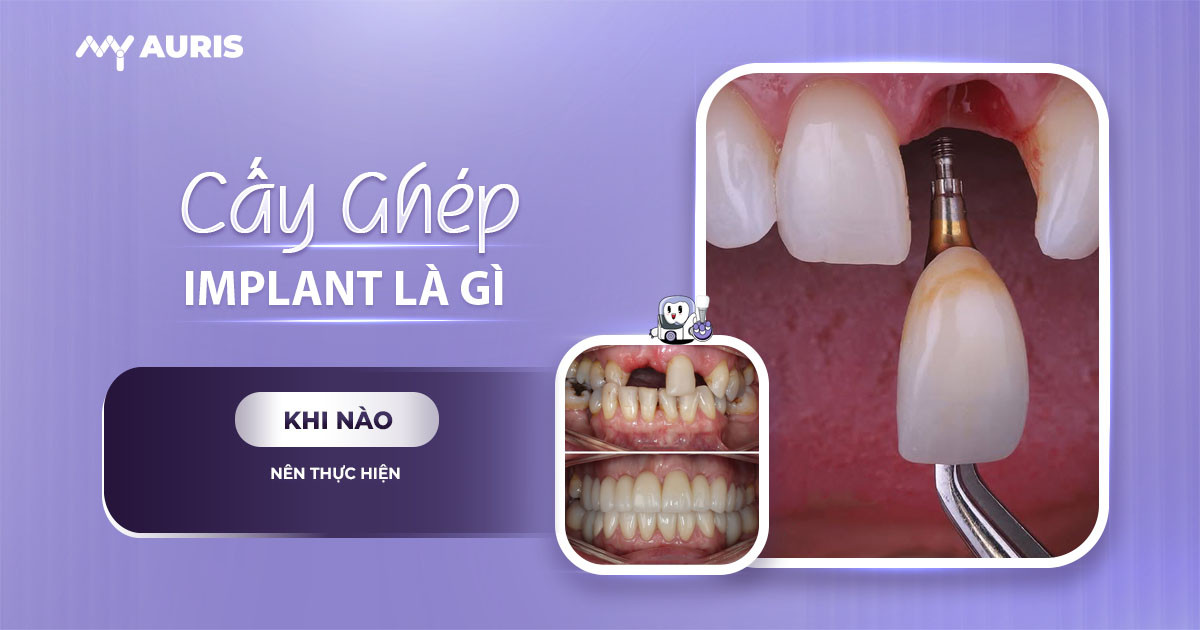Modern dentistry offers an optimal solution for long-term tooth loss: dental implant placement. This advanced technique is a leading dental treatment solution, helping you regain confidence with a radiant smile. Dental implants provide practical benefits, restoring chewing function and aesthetics like natural teeth. Discover useful information about the dental implant method below to better understand the procedure and the wonderful benefits it brings.
What Are Dental Implants?
Concept of Dental Implants
Dental implant placement is an advanced prosthetic tooth replacement method that uses artificial tooth roots made from titanium, a metal with excellent biocompatibility with the jawbone. An implant is essentially a small screw, similar in size to a natural tooth root, that is surgically placed directly into the jawbone at the site of a missing tooth to create a strong foundation for a fixed prosthetic tooth.
The dental implant technique perfectly restores missing teeth, providing high aesthetic results and long-lasting durability. It is considered a breakthrough in modern dentistry for replacing missing teeth without needing to grind down adjacent natural teeth or use removable dentures. As a result, patients no longer worry about jawbone loss or discomfort associated with traditional methods.

When should dental implants be performed?
Dental implant placement is indicated for cases such as:
- Individuals with missing teeth who need fixed prosthetics but do not want to grind down adjacent natural teeth.
- Cases of multiple tooth loss where there isn’t sufficient support for a bridge, or individuals who do not want to use removable dentures.
- People who wish to preserve their jawbone and prevent jawbone resorption after tooth loss.
Contraindications for dental implant placement
Although dental implant placement is a superior method, it is not suitable for everyone. Some absolute contraindications for implants include:
- Individuals with uncontrolled diabetes, as it affects the healing process.
- Pregnant women, to avoid adverse effects on the health of both mother and baby.
- Individuals with active infections in the implant placement area.
Additionally, caution should be exercised when placing implants in the following cases:
- Patients who are uncooperative during treatment and aftercare.
- Poor oral hygiene, which can easily lead to peri-implantitis.
- Individuals with chronic medical conditions such as high blood pressure or heart disease, which need to be well-controlled before implant placement.
- Smokers and alcoholics, as these factors increase the risk of implant failure.
- Individuals who have undergone radiation therapy to the jawbone, affecting the quality of bone receiving the implant.

What materials are dental implants made of?
Dental implant placement is an advanced technique that comprehensively restores missing teeth, from the artificial tooth root to the crown. Thanks to its perfect simulation of natural teeth, a dental implant not only ensures aesthetics but also effectively prevents jawbone loss – something traditional methods cannot achieve.
A standard dental implant consists of three main parts: the Implant Post, the Abutment connector, and the Porcelain Crown. Each component is made from specific implant materials, meeting strict medical standards, especially the implant post – the determining factor for durability and integration with the jawbone.
Implant Post
The Implant Post is the tooth root portion that is directly embedded into the jawbone. It has a small cylindrical, screw-like shape with threads that increase the contact surface and enhance biocompatibility. This type of post is usually made from Titanium – a precious metal with high biocompatibility, commonly used in modern medicine and dentistry.
Additionally, there is the Mini Implant line – a smaller post suitable for individuals with long-term bone loss or low jawbone density. The selection of the appropriate post type will be assessed by the dentist based on the specific oral condition.
Abutment Connector
The Abutment connector is the intermediate component that connects the implant post to the porcelain crown above. The Abutment screw is made of high-grade metal, designed with two ends – one securely attaches to the implant post, and the other is used to fix the crown.
Choosing a high-quality, precisely manufactured Abutment connector will help achieve optimal stability for the dental implant procedure and extend the lifespan of the prosthetic tooth.
Porcelain Crown
The porcelain crown is the visible part of the tooth restored at the top, having a shape, color, and translucency similar to natural teeth. The crown is securely attached to the Abutment connector using specialized dental adhesive.
Currently, there are two types of porcelain crowns used in implant restorations:
- Porcelain-fused-to-metal (PFM) crowns: A metal core inside enhances durability, while the outer porcelain layer ensures aesthetics.
- All-ceramic crowns (All Ceramic or Zirconia): Metal-free, offering a natural appearance and health safety, suitable for anterior teeth.
Should you get dental implants when you have missing teeth?
Once you understand what dental implants are, you can easily decide whether to choose this method. In fact, dental implant placement is considered a modern tooth restoration solution, offering numerous superior benefits for individuals with missing teeth:
- In terms of aesthetics, dental implants have a shape, color, and luster almost identical to natural teeth, creating a natural and harmonious look with the overall facial appearance. This helps users feel more confident in communication and daily life.
- Chewing ability after implantation is comparable to natural teeth. You can eat comfortably without worrying about dietary restrictions or weak chewing force.
- The Titanium post used in this method is a high-grade medical material that causes no side effects, does not oxidize, and particularly has excellent bone integration capabilities. With proper dental care, implant teeth can remain stable for a long time, even a lifetime.
- The materials are safe, free from allergens or toxic substances, ensuring compatibility with the user’s body and reducing the risk of irritation or gum tissue damage.
- Furthermore, dental implants help prevent many complications from long-term tooth loss such as jawbone resorption, bad breath, gum recession, gaps between teeth, etc., thereby fully protecting the jaw structure and long-term oral health.
Dental Implant Procedure and Important Considerations
Steps in the Dental Implant Procedure
Dental implant placement is a modern tooth restoration solution that offers long-lasting effectiveness and high aesthetics. However, for successful implementation, patients need to undergo a standard implant procedure with a comprehensive evaluation from a specialist dentist.
The process begins with a CT scan to detailed examine the jawbone structure, helping the dentist create a personalized treatment plan tailored to each specific case. Subsequently, the steps will proceed as follows:
- Extraction of damaged or non-restorable teeth.
- Bone volume assessment: If the jawbone is suitable, the implant post will be placed immediately. Otherwise, bone augmentation may be necessary to ensure a stable foundation for the implant post.
- Osseointegration period: The implant will be placed into the jawbone and requires several months to integrate and stabilize within the bone structure.
- Once the implant is stable, the dentist will proceed with restoring the tooth using a porcelain crown to complete the function and aesthetics of the mouth.
The entire dental implant process can take from 3 to 9 months, depending on the extent of damage, recovery after bone augmentation, and the rate of bone integration for each individual.

Important Considerations Before and After Dental Implant Placement
To ensure a safe and optimal outcome for the dental implant procedure, patients should note some important considerations:
Before Implant Placement:
- Maintain a healthy diet, get adequate rest, and keep a relaxed mindset to ensure good health for the surgery.
- Absolutely avoid stimulants.
- Discontinue anticoagulant medications at least 1 week before implantation as directed by the doctor.
- Undergo clinical tests if required to check overall health.
After Implant Placement:
- Properly care for and clean your mouth, preventing bacteria from attacking the implant area, which could lead to bone inflammation, bone loss, or a loose tooth.
- Avoid chewing or biting overly hard foods during the initial period.
- If any unusual symptoms occur, such as pain, throbbing, or a loose implant, seek immediate examination at a reputable dental clinic.
- Attend regular check-ups every 6 months to monitor the stability of the implant post and overall oral health.
If you are interested in dental implant techniques, please visit My Auris Dental Clinic for a direct examination and consultation with a leading specialist dentist. With modern procedures and standard services, we are committed to delivering optimal treatment results. Additionally, you can find detailed information about this technique or quickly book an appointment via hotline 090.1958.868 for specific and dedicated guidance from My Auris’s team of specialists.





